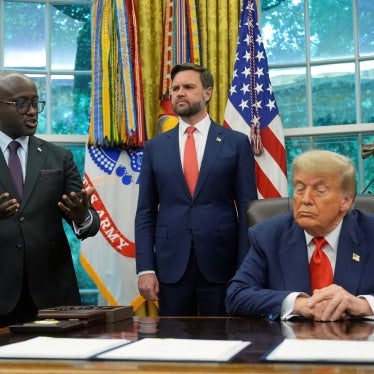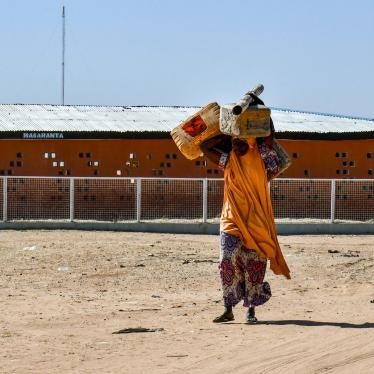(New York) - Refugees in Guinea are vulnerable to serious human rights abuse at the hands of Guinean authorities and civilian vigilantes, Human Rights Watch said in a report released today.
Guinean security personnel and civilians regularly harass refugees near their camps or as they move through the country to safer areas. Checkpoints along the roads are particularly dangerous locations, where refugees are often subjected to arbitrary strip searches, beatings, sexual assault and extortion. In the report, "Refugees Still at Risk: Continuing Refugee Protection Concerns in Guinea," Human Rights Watch has also documented the cases of refugees who were tortured or beaten to death while detained in Forecariah Prison, southeast of Conakry.
"These people are fleeing terrible civil wars, and they should not be subjected to more abuse when they reach their place of refuge," said Peter Takirambudde, executive director of the Africa division of Human Rights Watch. "This is not simply a moral argument, it is a fact of international law. Guinea must live up to its responsibilities."
For a decade, Guinea has hosted several hundred thousand refugees who have fled the conflicts in Liberia and Sierra Leone. This is one of the largest refugee populations in Africa, surpassed only by that in Tanzania, which is a bigger country.
More than 40,000 of these refugees have recently been relocated from embattled border areas to camps in the interior of Guinea. Despite this improvement, the refugees' long-term safety is still under threat, Human Rights Watch said.
Refugees have very little information about the situation in the new camps, on the roads in Guinea or in their home countries, and have great difficulty in accessing and obtaining the help of the office of the United Nations High Commissioner for Refugees (UNHCR). The number of UNHCR protection officers in the rest of Guinea is insufficient and subject to a high turnover.
Many refugees have been arrested for such arbitrary reasons as their age and size and have been held for periods up to several weeks in Guinean detention facilities in Forecariah, Gu?k?ou, and Kissidougou, often without charge. Still more refugees are vulnerable to all of these abuses because no valid refugee identification cards have been distributed by the Guinean government.
Many Guineans blame the refugees for the conflict at the border. While Guinea does have legitimate concerns about the threat to national security posed by rebel infiltration from Sierra Leone and Liberia, these concerns do not excuse the harassment and physical threats that cause refugees in Guinea to live in fear, Human Rights Watch said.
Since September 2000, a combination of Sierra Leonean Revolutionary United Front (RUF) rebels and armed Liberian forces have repeatedly attacked and burned refugee camps and Guinean villages along the border, killing, injuring, abducting, and forcing their residents to flee. The Liberian government has also launched cross-border attacks, accusing Guinea of providing support and hosting a Liberian rebel group, the Liberians United for Reconciliation and Democracy (LURD).
In September 2000, Guinean President Lansana Conte made an inflammatory speech indiscriminately blaming refugees for the border destabilization and calling on the Guinean population to defend their country against foreign invasions. Police, soldiers and civilian militias launched widespread violence against thousands of refugees in the camps and in the capital Conakry following this speech. In the months that followed, a number of cross-border attacks into Guinea by Liberian forces and Sierra Leonean RUF rebels resulted in the deaths of hundreds of Guineans and refugees, and displaced thousands of refugees and local residents.
Refugees in Guinea are presented with choices that all pose risks to their long-term personal safety. They can remain in the border area which is under attack; move to new camps within Guinea, where they may be more vulnerable to hostility from the local population; or return to Sierra Leone or Liberia, which both remain unstable.
Recently, UNHCR in Guinea has focused on the relocation of refugees away from the border area. The operation was completed in May 2001, but many refugees remain in the border areas where they are now entirely without international protection. Donor governments have also failed to provide the needed funding for assistance and protection of refugees in Guinea.
Human Rights Watch welcomed the relocation process as a major step towards assuring refugee protection, but urged UNHCR to pay closer attention to abuses being committed against refugees by the Guinean authorities and civilians hostile to the refugee presence.








